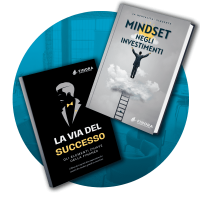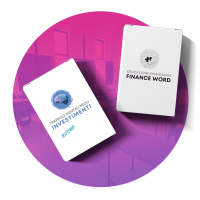Financial Consultants



Enhance negotiations and build client loyalty
In the world of financial consulting, standing out from the competition and building lasting relationships with clients is crucial. Financial consultants who add value not only through their expertise but also through concrete gestures can significantly strengthen their position and increase client loyalty. The educational cards, books, and other solutions offered by EducazioneFinanziaria.biz are not just learning tools, but they can become powerful educational gifts that help the consultant leave a lasting impression during negotiations, retain existing clients, and differentiate themselves in the eyes of potential leads.
Incorporating educational gifts into your financial consulting strategy not only enhances the perception of the consultant but also creates a deeper and longer-lasting bond with clients. The educational cards, books, and other solutions from EducazioneFinanziaria.biz are powerful tools that can be used to foster client loyalty, stand out from the competition, and reinforce the consultant’s position as a trusted partner. Offering these gifts during negotiations or as part of ongoing consultation ensures that clients not only appreciate the service received but also remember it and recommend it to others. Investing in these educational gifts means investing in the long-term success of your financial consulting business.
Financial Consultants



Differentiation Through Educational Solutions
In a competitive market, standing out is essential. Offering educational gifts during negotiations or initial meetings with potential clients can make the difference between being remembered or forgotten. Solutions like simulation games or interactive quizzes can be presented as a way for leads to better understand their finances in a fun and engaging way. This approach not only makes the consultant unique in the eyes of potential clients but also demonstrates a proactive commitment to providing value from the very first contact. Leads who receive these tools will have a positive and distinctive perception of the consultant, increasing the likelihood of turning them into long-term clients.
Educational Gifts to Strengthen Relationships
Educational gifts are much more than simple tokens; they are investments in the client relationship. By offering tools that help clients improve their financial skills, consultants demonstrate a genuine interest in their long-term financial well-being. This creates a bond of trust that is hard to break. Educational solutions such as behavioral cards or self-assessment tests can be particularly useful in keeping the client engaged and interested even after the consultation, ensuring that the client continues to see the consultant’s value outside of formal meetings.
The Objectives of Educational Gifts

BUILD CLIENT LOYALTY
Enhance your client relationships by showing that you care about their knowledge and are committed to providing educational gifts.

IMPROVE NEGOTIATIONS
Immediately showcase your authority and leave a useful and personalized gift with your logo. They will surely remember you!

INCREASE BRAND REPUTATION
Highlight your skills and knowledge. Improve your brand and leave a lasting impression in your communication.
Do you want a custom solution or personalized order?
Some of Our Products

Books and Manuals
Gifting a financial education book or manual during a negotiation or as a token of appreciation after a consultation is an excellent way to show professionalism and dedication. Our books cover a wide range of topics, from budgeting to investment management, and can be selected based on the specific interests or needs of the client. This type of gift not only provides tangible value but also underscores the consultant’s commitment to supporting the client in the long term. Clients who receive these gifts are more likely to remember and appreciate the consultant, thus improving loyalty.

Educational Flashcards
Educational and behavioral cards can be used as smart and personalized gifts for clients. By offering a set of cards that cover topics such as saving, investing, or debt management, the consultant provides a tool that the client can use independently to improve their financial awareness. This type of gift not only demonstrates the consultant’s attention to the client’s educational needs but also their commitment to providing added value. Additionally, the cards can be customized with the consultant’s logo or message, reinforcing the brand and keeping the consultant’s memory alive in the client’s mind.

Behavioral Finance Cards (Test)
The Behavioral Finance Test using Cards is an innovative tool that combines the interactivity of cards with behavioral analysis, offering financial consultants a unique and engaging way to explore their clients' habits and biases. This test is designed to help clients better understand their tendencies and unconscious reactions in financial decisions, such as risk aversion, the anchoring effect, or confirmation bias. Using the cards, the consultant guides the client through a series of scenarios and questions that reveal how these psychological factors influence financial choices.
The best choice for you
Frequently Asked Questions
Financial education is the process of learning and understanding how to manage money effectively. It includes knowledge about saving, investing, debt management, budgeting, and long-term financial planning. The goal is to develop skills that enable individuals to make informed and responsible financial decisions.
Financial education is essential because it helps people better manage their money, avoid financial pitfalls, and plan for the future. Good financial knowledge can prevent issues such as excessive debt, lack of savings for emergencies or retirement, and improve overall economic well-being.
Everyone, regardless of age, social status, or income, can benefit from financial education. Young people can learn to manage their first earnings and savings, while adults can enhance their financial planning and investment skills.
What are the main topics covered in financial education?
Financial education covers a wide range of topics, including:
• Budgeting: How to create and maintain a budget to manage income and expenses.
• Saving: The importance of saving money and strategies to do so.
• Investing: The basics of investing and how to grow your capital over time.
• Debt Management: How to avoid, manage, or reduce debt.
• Planning for the future: How to financially prepare for future events, such as retirement or buying a house.
There are several resources available to improve financial education, including books, online courses, workshops, and financial advisors. Additionally, many banks and organizations offer free financial education programs.
Financial education provides the knowledge and skills to manage money independently, while financial consulting involves receiving personalized advice from a certified professional registered in the financial advisors’ registry.
A good level of financial education contributes to greater economic security and reduces stress related to financial problems. Knowing how to manage money enables more conscious decision-making, improving quality of life and the ability to achieve financial goals.
